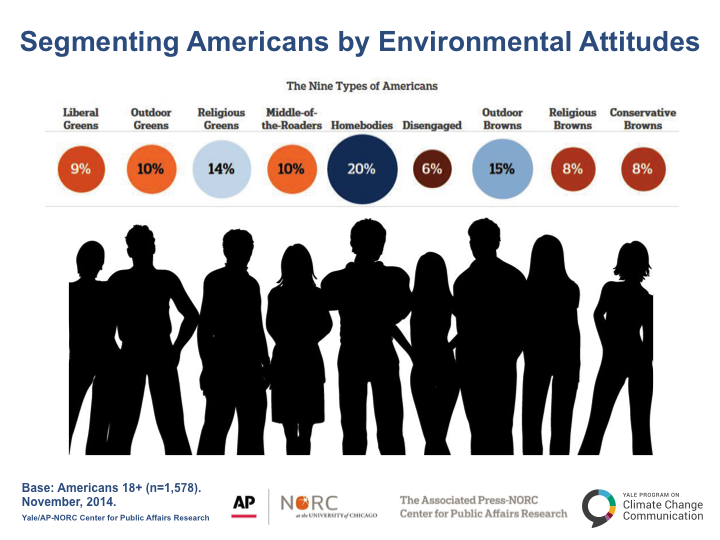50 Shades of Green? Environmental Attitudes Vary Widely in US

You don't have to be a nature lover to be "green." A new survey suggests that Americans' attitudes about protecting the environment aren't just linked to their love of the great outdoors.
Turns out, religion and politics might be strongly tied to how people perceive environmental issues, according to the survey of 1,500 Americans who answered questions about their interactions with the natural world, their religious and political beliefs and their stance on environmental issues, such as global warming.
Based on the answers, the researchers created nine distinct profiles, or "shades" of green: Only 10 percent of Americans fall into the group that the researchers labeled "outdoor greens." This group consists of staunch environmentalists who also spend a lot of time enjoying nature. For these folks, a strong appreciation for the natural world seems to be the motivating factor behind their support of environmentalist ideas (like decreasing the burning of fossil fuels). [8 Ways Global Warming Is Already Changing the World]
Yet, nearly as many Americans (9 percent) are "liberal greens," or people who support environmentalist causes even though they don’t spend a great deal of time outdoors. A liberal green's connection to environmentalist causes correlates with a liberal political ideology and a belief that "it is humankind’s responsibility to protect and care for the Earth and its natural resources,” according to the researchers. They are the least religious of the groups, with just 17 percent saying they attend weekly religious services, and more than half (55 percent) have a bachelor's degree or higher.

On the other end of the spectrum, the researchers found that about 8 percent of Americans are "religious browns," or highly religious people who don't support environmental causes and who don't spend a lot of time in nature — 17 percent say they feel completely separate from nature. And there are "conservative browns," too. These politically conservative folks (about 87 percent identify as Republicans) make up about 8 percent of the American population and do not support environmentalist causes, even though many of them say they enjoy outdoor activities.
But the liberal and outdoor greens and the religious and conservative browns represent relatively small segments of the American population. The vast majority of Americans (65 percent) are neither totally green nor totally brown. They fall somewhere in the middle of the spectrum and hold "complex and nuanced perspectives on the environment," according to the researchers.
Take, for example, the "outdoor browns," who are representative of 15 percent of the American population. People in this group spend a lot of time in nature (doing things like gardening, hunting and boating), but they don't feel that the world now faces any pressing environmental crises. And then there are the "religious greens," who don't spend much time outside, but who, for religious reasons, believe that human beings have a duty to protect the environment. [The Reality of Climate Change: 10 Myths Busted]
Sign up for the Live Science daily newsletter now
Get the world’s most fascinating discoveries delivered straight to your inbox.
But of the nine groups that the researchers created to explain the results of the survey, one stands out above the rest because of its size. By far the largest group, representative of 20 percent of Americans, is the "homebody" group. These are people who spend more time inside than they do outside and who are largely apathetic about environmental issues. Homebodies do not consider themselves to be environmentalists and aren't worried about the current state of the environment. While the majority of homebodies think that it's the responsibility of humans to care for the planet, most don't agree with common environmentalist ideas, like the importance of decreasing fossil fuel production or increasing government regulation of the activities that affect the environment.
When the results concern a single environmental issue like global warming, these "environmental profiles" become even clearer: Nearly all liberal greens (96 percent) agree that global warming is happening, followed by the outdoor greens and religious greens (both are 88 percent). They are followed by the outdoor browns, with 44 percent saying that the world is warming, compared to 1 in 10 conservative browns saying the same. Some 83 percent of conservative browns and 54 percent of religious browns say global warming is not occurring.
The full results of the survey, conducted by the Associated Press-NORC Center for Public Affairs Research and researchers from the Yale School of Forestry and Environmental Studies, can be found on the Associated Press-NORC Center for Public Affairs Research's website.
Follow Elizabeth Palermo @techEpalermo. Follow Live Science @livescience, Facebook & Google+. Original article on Live Science.

Elizabeth is a former Live Science associate editor and current director of audience development at the Chamber of Commerce. She graduated with a bachelor of arts degree from George Washington University. Elizabeth has traveled throughout the Americas, studying political systems and indigenous cultures and teaching English to students of all ages.










